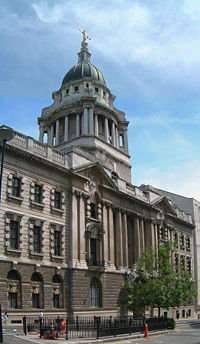Central Criminal Court (England and Wales)
| Central Criminal Court of England and Wales | |
|---|---|
| Old Bailey | |

The Old Bailey in 2004
|
|
| Jurisdiction | England and Wales |
| Location | London, EC4 |
| Recorder of London | |
| Currently | Nicholas Hilliard |
| Since | 6 January 2015 |
The Central Criminal Court of England and Wales, commonly referred to as the Old Bailey from the street on which it stands, is a court in London and one of a number of buildings housing the Crown Court. Part of the present building stands on the site of the medieval Newgate gaol, on a road named Old Bailey that follows the line of the City of London's fortified wall (or bailey), which runs from Ludgate Hill to the junction of Newgate Street and Holborn Viaduct. The Old Bailey has been housed in several structures near this location since the sixteenth century, and its present building dates from 1902.
The Crown Court sitting at the Central Criminal Court deals with major criminal cases from within Greater London and in exceptional cases, from other parts of England and Wales. Trials at the Old Bailey, as at other courts, are open to the public; however, they are subject to stringent security procedures.
The court originated as the sessions house of the Lord Mayor and Sheriffs of the City of London and of Middlesex. The original medieval court was first mentioned in 1585; it was next to the older Newgate gaol, and seems to have grown out of the endowment to improve the gaol and rooms for the Sheriffs, made possible by a gift from Richard Whittington. It was destroyed in the Great Fire of London in 1666 and rebuilt in 1674, with the court open to the weather to prevent the spread of disease.
In 1734 it was refronted, enclosing the court and reducing the influence of spectators: this led to outbreaks of typhus, notably in 1750 when 60 people died, including the Lord Mayor and two judges. It was rebuilt again in 1774 and a second courtroom was added in 1824. Over 100,000 criminal trials were carried out at the Old Bailey between 1674 and 1834.
...
Wikipedia
